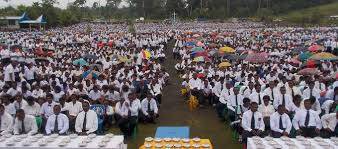A lot of preparation had gone into the visit of the Chief Apostle and the divine service in Namwala, Zambia, on 10 June. “Now you might think: we are done. The divine service has started and we can relax and listen,” Chief Apostle Jean-Luc Schneider said at the beginning of his sermon. “Sorry to disappoint you,” he went on. Today marks the beginning of new work that awaits us: we have to listen to the word and then we will all, I am quite sure, have a lot of work to do in the days and weeks ahead in order to carry out what our heavenly Father expects of us.
Transferring a parable into the present
The Chief Apostle said that God wants Christians to examine themselves. The Chief Apostle illustrated this with the parable from Matthew 21: 28–31: “But what do you think? A man had two sons, and he came to the first and said, ‘Son, go, work today in my vineyard.’ He answered and said, ‘I will not,’ but afterward he regretted it and went. Then he came to the second and said likewise. And he answered and said, ‘I go, sir,’ but he did not go. Which of the two did the will of his father? They said to Him, ‘The first.’”
This is how Jesus explained to the Jewish religious leaders that although they had said yes to God and adhered to the laws of Moses, they had not accepted the message that Jesus was the Saviour. Conversely, many sinners did not respect the law but believed in Jesus, changed their minds, and were saved.
“Let’s see what this tells us today,” the Chief Apostle continued. “It means that we should examine ourselves.” He said that New Apostolic Christians had made their vow to God, Jesus, and the apostolate. “Now we must take a critical look to see what has become of our promise.”
Introspection: am I still trying to overcome sin?
“We promised God: I renounce Satan,” the Chief Apostle reminded the members. “Let’s examine ourselves to see where we stand in terms of our determination to overcome sin and renounce the devil.” The trend today is to consider some sins more serious than others. “Especially the sins of our neighbour are considered far more serious than our own.” Sometimes people think that God will be merciful and forgive their sins. “But that is not how it works. Your sins will only be forgiven if you see their seriousness and if you repent,” the Chief Apostle said. And some people have other priorities in life than the fight against sin. “We have promised God that we will fight against sin, so let us do some introspection in the days ahead.”
Introspection: do I still agree with Jesus’ message?
We said yes to Jesus Christ and we want to follow Him. “But do we really agree with the message of Christ?” the Chief Apostle asked, and listed the statements of Jesus so that everyone can check for themselves:
“Salvation means eternal life and not earthly wealth.”
“This is not about keeping rules and laws, but about our motivation and love for God.”
“We cannot earn salvation. We can only be saved by grace.”
“I did not come to punish sinners, but to save them.”
“I did not come to be saved but to serve.”
Introspection: is the apostolate still important to me today?
The Chief Apostle reminded the brothers and sisters that we said yes to the apostolate. The Apostles proclaim the gospel, administer the sacraments, and interpret the Bible. Do we still agree with that or do we want to enforce our own interpretation and our own ideas, the Chief Apostle asked.
It is not too late to change
The Chief Apostle asked the congregation, “What has changed in your heart? Is there more love in your heart than there was two or three years ago? Are you able to forgive faster than five years ago? Are you more like Jesus than you were five years ago?” He reminded the brothers and sisters, “We made a promise, but if we realise, ‘Oh, I’ve changed my mind a little bit,’ it is still not too late to do anything about it.”
Changing ourselves made easy
Help for this comes from God:
“Jesus helps us. He gives us His word.”
“If something unpleasant comes up in our life, it is not a punishment but an offer from God. He just wants us to become aware that things are not yet perfect.”
“God gives us role models for whom I am personally very grateful,” the Chief Apostle said. “I have met brothers and sisters who I admire for their faith and the way they handle their situation. And I realise that I could not do what they do.”




No comments yet
Be the first to share your thoughts!